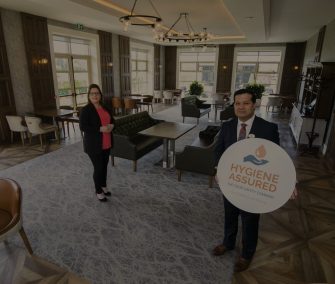Advice for food business operators – COVID-19
Advice for Food Business Operators
Today we find ourselves in an unprecedented situation, one which most of us had no contingency plans to cover. We try to prepare for every possibility, every unexpected event or adverse weather condition, however, no one could have prepared us for this. Maybe it is our own fault, for reacting too slowly, for thinking of what was going on in China as ‘their’ problem, rather than ‘ours’. How wrong we were to have this frame of mind.
Covid-19 is here and rampant throughout the island of Ireland. While there are copious articles about what we as a nation can to do to help “flatten the curve”, what can you, as a food business do, in order to not only slow the spread of infection but to protect your staff and customers in the best way possible.?
The first and most obvious method of action is: you must adhere to the advice offered by only legitimate sources (The HSE, The Department of Health and The WHO). This is important in controlling the spread of fear, along with the virus itself. With a novel disease such as this, the advice is forever evolving as more information becomes available. Keeping up-to-date with changes to guidelines ensures you and your business are following all the steps necessary to keep yourself, and your consumers safe. Last week, only those returning from countries considered ‘high-risk’ were told to self-isolate. Now, anyone showing symptoms must follow these infection control precautions. This is an example of how quickly guidelines and advice can change. By following only reliable sources, you also help stop the spread of false information, contributing to fear in many. Stick to one media outlet as your source for updates, whether it be RTE news or an alternative radio station, thus allowing you to catch all vital information as it is released.
The second commitment you must make is to ensure these guidelines can be adhered to within the workplace. Whether it means separating your tables to be 2 metres apart or changing your business model to focus on a take-away service only. It is your responsibility as a food business operator to ensure a duty of care for all your staff and customers. This also means ensuring there is an open and honest communication line with staff. They must feel their jobs or reputation are not being placed in jeopardy if they phone in and say they’ve woken up with a cough. You must give them the recommended time off work with minimal questioning.
You must have policies and risk assessments in place regarding Covid-19. Just because you have hand sanitiser at every door and you’re cleaning surfaces every 10 minutes, does not mean you are immune to the virus. At any moment, a customer or indeed a staff member could walk into your premises with the virus- and then what? You should have policies in place regarding exactly what you’re going to when faced with such a situation. Your business should be risk assessed, to allow you to see where exactly your most vulnerable areas are. Maybe it’s the delivery truck driver who comes into the kitchen each morning to leave the fresh fruit on the counter before service, or maybe your ‘fill-your-own bottle’ water fountain that seemed a great solution to global warming is now potentially harbouring dangerous micro-organisms. Either way, you need to examine your biggest internal threats and determine how to reduce their likelihood.
Where possible, you must re-invent your working patterns. Minimizing staff and reexamining shift patterns is also important to ensure minimal cross-over of staff, for example in changing rooms and in the canteen. Staggering start, end and break times are the simple methods of tackling this issue. The scope of the business may need to be re-designed, for example, maybe you have decided to offer a takeaway or delivery service rather than an in-house restaurant. This is a good way of ensuring cash flow whilst also minimising risk to your staff and customers, and it is an approach that a lot of food businesses have chosen to take. However, if the scope of your business has changed, it is important you notify your Environmental Health Officer (EHO) and update your food safety management system (FSMS) accordingly. Food handlers must remember their obligations to the production of safe food, with or without the threat of Coronavirus.
Talk to your staff. Having open communication helps not only their mental health and well-being but can often improve the functionality of your business. It is a worrying time for many, and your reassurance can mean a lot to them. Checking in on staff, talking to them one-on-one and having frequent meetings (teleconferencing preferably) can reassure them you have their best interest at heart and can also show them they are not alone. Employees are the front-line of your company, they are responsible for the day-to-day running of the business, they know it often better than the management. Consult with staff about your new measures in place, maybe they know where signage will be most frequently seen or which hand wash basins are used most regularly and should be refilled more frequently.
Finally, as difficult as it is to think about, you may be left with little choice but to close. While it might seem a tough decision to make, if you cannot be certain that the measures you have in place will fully protect your staff and customers, it may be in your best interest to cease trading for the moment, until you can determine it is safe to re-open. The decision to close is not admitting defeat, in fact, the opposite, it is putting a priority on the health and safety of stakeholders. Staff will not hold grudges against employers who choose their safety over financial profit. However, it is still important to comfort and reassure staff if this difficult situation arises and provide them with any documentation or information they may need. The Government has introduced the “COVID Pandemic Unemployment Payment”, which allows employees who are not being paid (due to situations arising because of Coronavirus), to receive 350 euro per week. Information of such benefits should be provided to staff to ensure they are all aware of the support they can receive. It is important to keep communication channels open with all stakeholders in the event of a closure, in order to ensure your business can quickly re-open when the time comes.
The Cabinet has also approved an emergency wage subsidy scheme under which the Government will pay 70% of a workers salary up to a cap of €410 per week net – equivalent to the after tax income of a worker on around €38,000. The scheme will initially run for 12 weeks, and employers will be free to top-up the Government’s element of the salary. The scheme is targeted at companies hit by the collapse of economic activity triggered by the coronavirus outbreak – and employers seeking to avail of it would have to demonstrate a reduction in income of at least 25%, along with cash flow difficulties.
It is hoped this will keep employees and employers connected, and make it easier to restart businesses when the crisis ends.
Keep up to date with guidelines and recommendations and try to avoid ‘fake news’. As always, The Food Safety Company is available should you have any issues or queries.
Tags: HACCP, Business Planning, Food, Cleaning, Infection Control, Hospital, Food Safety Professionals Association, FSPA, Food Safety, Food Safety Authority of Ireland, FSAI, handwashing, coronavirus, covid-19


